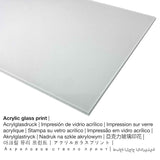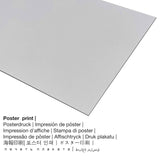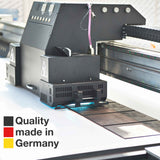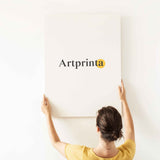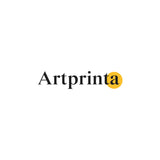Jacob Maris, 1880 - Ships in the port of Dordrecht - fine art print
Tax included. Shipping calculated at checkout.
Background information on the art print of the painting named "Ships in the port of Dordrecht"
Ships in the port of Dordrecht was painted by the Dutch artist Jacob Maris in 1880. The work of art is included in the Rijksmuseum's digital art collection. With courtesy of: Rijksmuseum (licensed - public domain).: . On top of that, alignment is landscape and has an aspect ratio of 16 : 9, which implies that the length is 78% longer than the width.
Artwork description from the museum (© - Rijksmuseum - Rijksmuseum)
Ships in the port of Dordrecht. In the background the Great Church.
Work of art information
| Title of the work of art: | "Ships in the port of Dordrecht" |
| Artwork classification: | painting |
| Umbrella term: | modern art |
| Temporal classification: | 19th century |
| Created: | 1880 |
| Artwork age: | around 140 years old |
| Museum: | Rijksmuseum |
| Location of the museum: | Amsterdam, Netherlands |
| Available under: | www.rijksmuseum.nl |
| License of artwork: | public domain |
| Courtesy of: | Rijksmuseum |
Contextual artist data
| Name of the artist: | Jacob Maris |
| Gender of the artist: | male |
| Nationality: | Dutch |
| Jobs of the artist: | painter |
| Country: | the Netherlands |
| Classification of the artist: | modern artist |
| Lifetime: | 62 years |
| Born: | 1837 |
| Year died: | 1899 |
Available materials
For every fine art print we offer different sizes & materials. You can choose your your favorite size and material among the following options:
- The poster print (canvas material): A poster is a printed flat canvas paper with a nice surface structure. It is excellently suited for putting the fine art print with the help of a custom frame. Please note, that depending on the absolute size of the poster we add a white margin between 2 - 6cm around the work of art, which facilitates the framing with a custom frame.
- Aluminium dibond print (metal): These are metal prints on aluminium dibond with an impressive effect of depth - for a modern impression and a non-reflective surface structure. For our Direct Aluminium Dibond option, we print your chosen artpiece onto the surface of the white-primed aluminum composite. The colors of the print are luminous, fine details are very clear.
- Canvas print: A canvas direct print is a printed canvas stretched on a wood stretcher. How can I hang a canvas print on the wall? Canvas Prints have the advantage of being relatively low in weight, meaning that it is easy to hang up your Canvas print without the use of extra wall-mounts. A canvas print is suited for all kinds of walls.
- Printed acrylic glass: An acrylic glass print, which is sometimes referred to as a UV print on plexiglass, transforms your favorite original into brilliant home decoration. Above all, the acrylic art print makes a distinct alternative option to canvas or aluminium dibond fine art prints. The work of art is being printed with the help of modern UV direct printing machines. This creates the effect of vibrant, deep colors. The great advantage of a plexiglass art print is that contrasts as well as painting details will be more recognizeable due to the granular gradation in the picture.
Item table
| Article classification: | art copy |
| Method of reproduction: | digital reproduction |
| Production technique: | digital printing |
| Origin of the product: | German production |
| Stock type: | production on demand |
| Intended product usage: | wall decoration, wall gallery |
| Alignment: | landscape alignment |
| Side ratio: | 16 : 9 (length : width) |
| Side ratio interpretation: | the length is 78% longer than the width |
| Available reproduction fabrics: | acrylic glass print (with real glass coating), canvas print, poster print (canvas paper), metal print (aluminium dibond) |
| Canvas print (canvas on stretcher frame) size variants: | 90x50cm - 35x20", 180x100cm - 71x39" |
| Acrylic glass print (with real glass coating): | 90x50cm - 35x20", 180x100cm - 71x39" |
| Poster print (canvas paper) sizes: | 90x50cm - 35x20" |
| Aluminium print: | 90x50cm - 35x20" |
| Art print framing: | no frame |
Legal disclaimer: We try whatever we can in order to describe the products as closely as possible and to display them visually. However, the pigments of the print products and the printing might differ marginally from the representation on the device's screen. Depending on your screen settings and the nature of the surface, colors can unfortunately not be printed one hundret percent realistically. Given that all the art prints are processed and printed manually, there might as well be minor differences in the exact position and the size of the motif.
This text is copyrighted ©, Artprinta.com (Artprinta)



